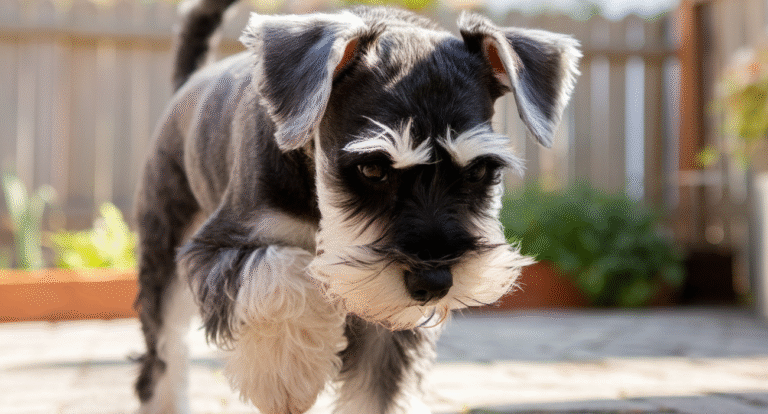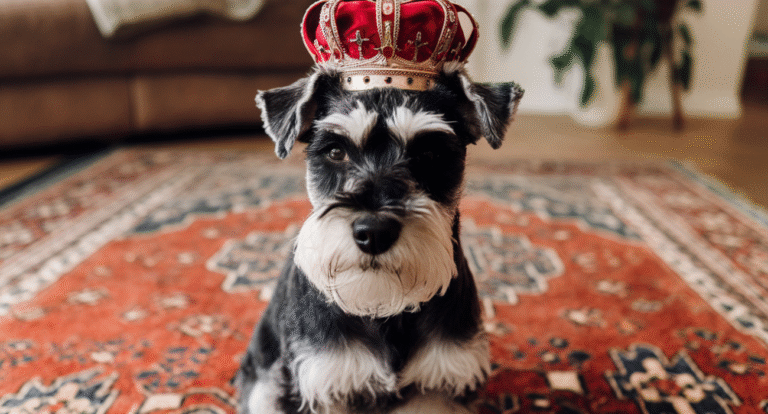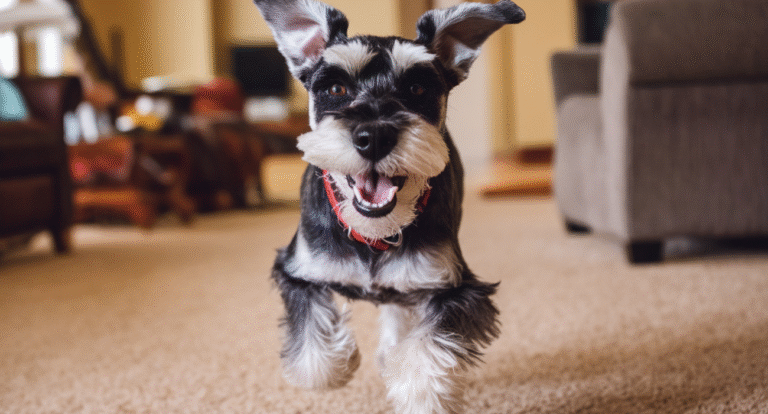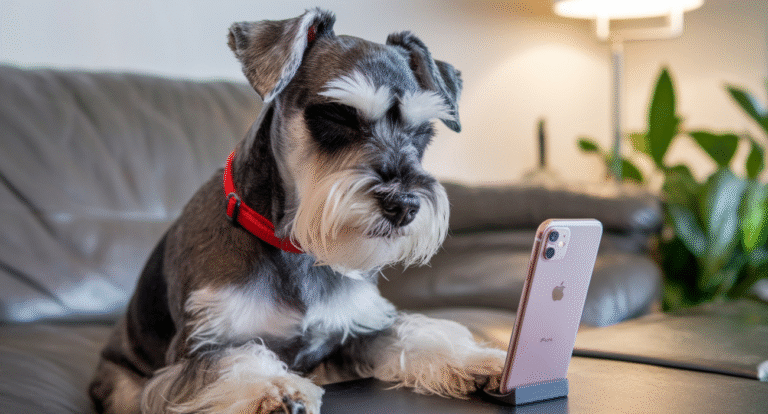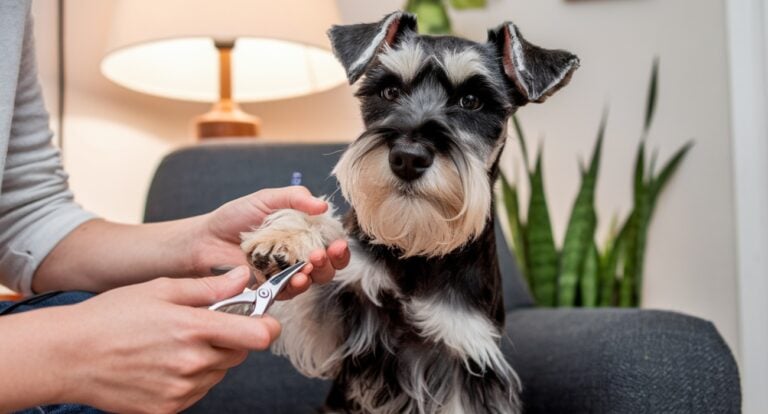Simple, crunchy, and affordable, frozen carrots may be the surprising secret to keeping your schnauzer’s teeth healthy and sparkling clean.
Let’s talk about dental care for a second. Boring, right? Wrong! Especially when your solution involves watching your Schnauzer’s adorable confusion as they figure out why their new treat is both delicious and mysteriously cold.
Frozen carrots aren’t just a quirky snack idea; they’re a legitimate dental tool that happens to come from the produce aisle rather than the pet store. And honestly, anything that makes your dog’s breath smell less like yesterday’s dinner deserves serious consideration.
Why Dental Care Matters More Than You Think
Schnauzers are absolutely magnetic with their spirited personalities and those distinguished facial whiskers, but lurking beneath that irresistible scruffy charm is a breed that faces some real dental challenges. Think about it: smaller mouths often mean more crowded teeth, and crowded teeth create perfect hiding spots for trouble.
Plaque buildup doesn’t mess around. It starts as a soft, barely noticeable film and quickly transforms into rock-hard tartar that your regular toothbrush can’t touch. From there, gum disease creeps in like an uninvited guest, potentially leading to pain, infections, and health complications that extend far beyond just bad breath.
The reality check: Dental disease affects over 80% of dogs by age three, making it one of the most common health issues our furry friends face.
The statistics might sound alarming, but here’s the thing about Schnauzers: they’re tough little characters who often hide discomfort until problems become serious. This makes preventive care absolutely crucial, and that’s where our frozen orange heroes come into play.
The Science Behind the Crunch
Frozen carrots work their magic through a surprisingly elegant combination of physics and biology. When your Schnauzer chomps down on that icy vegetable, several beneficial things happen simultaneously.
First, the firm texture acts like nature’s toothbrush. Unlike soft treats that can actually stick to teeth and contribute to plaque formation, frozen carrots provide the perfect amount of abrasive action to scrub away soft buildup before it has a chance to harden into problematic tartar.
The chewing action itself stimulates saliva production, and saliva is like your dog’s personal mouth rinse. It helps wash away food particles, neutralizes harmful bacteria, and contains natural enzymes that support oral health. More chewing equals more saliva, which equals a cleaner, healthier mouth.
But here’s where it gets really interesting: the cold temperature isn’t just refreshing. That icy sensation can actually provide soothing relief for irritated gums, making frozen carrots especially appealing for teething puppies or older dogs dealing with sensitive mouths.
Beyond Dental Health: The Bonus Benefits
While we’re focusing on teeth, frozen carrots bring a whole arsenal of additional perks that make them even more appealing as a regular treat option.
| Benefit | Why It Matters for Schnauzers |
|---|---|
| Low Calorie | Perfect for weight-conscious pups (only 25 calories per medium carrot) |
| Beta Carotene | Supports eye health and immune function |
| Fiber Content | Aids digestion and promotes gut health |
| Natural Vitamins | Provides A, K, and potassium without artificial additives |
| Mental Stimulation | The challenging texture keeps minds engaged |
Schnauzers, bless their food-loving hearts, can be prone to weight gain. Traditional dental chews often pack surprising amounts of calories and questionable ingredients. Carrots flip this script entirely. They deliver satisfying crunch and flavor while keeping calorie counts impressively low.
The beta carotene content deserves special mention. This powerful antioxidant converts to vitamin A in your dog’s body, supporting everything from vision health to immune system function. For a breed that’s naturally active and alert, this nutritional boost aligns perfectly with their energetic lifestyle.
The Practical Guide to Carrot Success
Getting started with frozen carrots requires more strategy than you might expect. Size matters tremendously, especially for Schnauzers whose mouths vary significantly depending on whether you’re dealing with a Miniature, Standard, or Giant variety.
- For Miniature Schnauzers: Cut carrots into finger-sized pieces about 2-3 inches long. This provides enough surface area for effective chewing while preventing choking hazards.
- For Standard Schnauzers: Half a large carrot or a whole medium carrot typically works well. They can handle bigger pieces and will appreciate the extended chewing session.
- For Giant Schnauzers: Full-sized carrots or even slightly larger pieces are usually appropriate, though always supervise initial attempts to gauge your dog’s chewing style.
Pro tip: Start with slightly softer frozen carrots by taking them out of the freezer 5-10 minutes before serving. This makes the initial introduction less shocking while still providing dental benefits.
The freezing process itself is straightforward, but timing can optimize the experience. Fresh carrots straight from the freezer are extremely hard and might be off-putting for some dogs. Letting them thaw just enough to lose that rock-solid consistency often increases acceptance while maintaining the beneficial texture.
Safety First: What Every Owner Should Know
Frozen carrots earn high marks for safety, but responsible serving requires attention to a few key details. Supervision during initial introductions helps you understand how your individual Schnauzer approaches this new texture and ensures they’re handling pieces appropriately.
Some dogs are aggressive chewers who might try to swallow large pieces too quickly. Others are more methodical, slowly working through their frozen treat. Understanding your dog’s style helps you adjust piece sizes and serving frequency accordingly.
Important reminder: Frozen carrots complement regular dental care but never replace it entirely. Daily brushing and professional cleanings remain the foundation of good oral health.
Digestive considerations matter too. While carrots are generally well-tolerated, introducing any new food should happen gradually. Start with small pieces every few days and monitor for any digestive upset. Too many carrots too quickly can lead to loose stools or stomach discomfort.
Watch for signs that your dog might be struggling with the texture or temperature. Excessive drooling, pawing at the mouth, or reluctance to continue chewing could indicate the carrot is too hard or cold for comfort.
Making It a Routine That Sticks
The beauty of frozen carrots lies in their simplicity, but creating a sustainable routine takes a bit of planning. Batch preparation works wonderfully: spend ten minutes once a week washing, cutting, and freezing several days’ worth of carrot pieces.
Storage becomes important for maintaining quality and convenience. Freezer bags or containers keep carrots fresh while making it easy to grab the right portion size. Some owners find success using ice cube trays for perfectly portioned smaller pieces.
Timing can enhance the experience significantly. Many Schnauzers enjoy their frozen carrots as an afternoon treat or post-walk reward. The cold temperature feels especially refreshing after exercise, and the extended chewing session provides mental stimulation during quieter parts of the day.
Consider your dog’s individual preferences and energy levels. Some Schnauzers attack frozen carrots with immediate enthusiasm, while others need encouragement or prefer them slightly thawed. There’s no wrong approach as long as your dog enjoys the experience and benefits from the dental action.
The cost effectiveness compared to commercial dental chews is remarkable. A bag of carrots costing a few dollars provides weeks of dental treats, making this approach both budget-friendly and nutritionally superior to many processed alternatives.
Integration with Overall Health Care
Smart Schnauzer parents view frozen carrots as one component of comprehensive dental care rather than a standalone solution. They work synergistically with regular brushing, professional cleanings, and other healthy habits to maximize oral health benefits.
Consider discussing this addition with your veterinarian, especially if your Schnauzer has existing dental issues or dietary restrictions. Most vets appreciate owners taking proactive steps toward preventive care and can offer personalized guidance based on your dog’s specific needs.
The long-term benefits extend beyond just cleaner teeth. Dogs with better oral health often show improved energy levels, better appetite, and enhanced overall wellbeing. When you consider that dental disease can contribute to heart, liver, and kidney problems, the simple act of offering frozen carrots takes on greater significance.
Regular monitoring helps you track progress and adjust your approach as needed. Look for improvements in breath freshness, reduced plaque buildup, and your dog’s enthusiasm for their frozen treats. These positive changes reinforce the value of maintaining this simple but effective routine.


